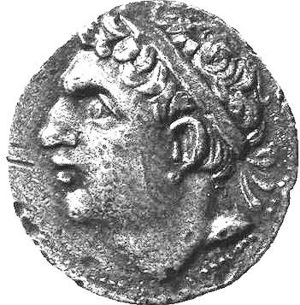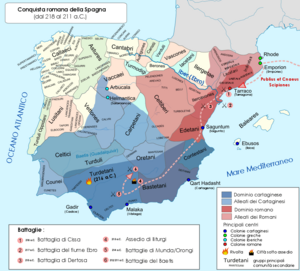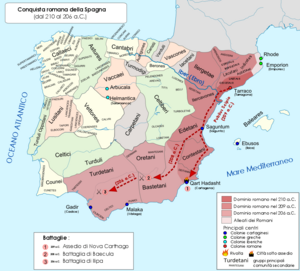Hasdrubal Barca facts for kids
Quick facts for kids
Hasdrubal, son of Hamilcar Barca
|
|
|---|---|

|
|
| Born | 245 BC Carthage, Ancient Carthage (modern Tunisia) |
| Died | 22 June 207 BC (aged 38) Metauro River, Roman Republic |
| Allegiance | Carthage |
| Rank | General |
| Battles/wars | Second Punic War:
|
Hasdrubal Barca (born 245 BC – died 22 June 207 BC) was a brave Carthaginian general. He was the son of Hamilcar Barca and the younger brother of the famous general Hannibal. Hasdrubal played a key role in the Second Punic War, fighting against the Romans in Spain and later in Italy.
Contents
Early Life and Command in Spain
Not much is known about Hasdrubal's early life. He was with his father, Hamilcar Barca, when Hamilcar died in battle against the Iberians in Spain. Hasdrubal later took command of the Carthaginian forces in Spain.
In 218 BC, his brother Hannibal marched from Spain to Italy to fight the Romans. Hannibal left Hasdrubal in charge of a large army in Spain. This army included 13,000 foot soldiers, 2,550 horsemen, and 21 war elephants. Hasdrubal's main job was to protect Carthaginian lands in Spain. He was also supposed to send help to Hannibal in Italy later on.
Hasdrubal faced two Roman commanders, the brothers Gnaeus and Publius Cornelius Scipio. These Roman generals had a strong army and a fleet of ships.
Battles in Spain
The Romans surprised the Carthaginians in Spain. They won the Battle of Cissa and set up a base at Tarraco. Hasdrubal, with fewer troops, launched a quick attack. He damaged the Roman fleet, reducing its fighting strength.
In 217 BC, Hasdrubal led a combined army and navy expedition. They moved north along the Ebro River. However, the Roman fleet surprised the Carthaginians. They destroyed most of Hasdrubal's navy at the Battle of Ebro River. This forced Hasdrubal to retreat. He needed to protect Carthaginian lands from sea attacks.
After this defeat, Hasdrubal had to deal with a rebellion. The Turdetani tribe in Spain rose up against Carthaginian rule. Hasdrubal spent all of 216 BC putting down these rebellions near Gades.
Carthage ordered Hasdrubal to march to Italy and join Hannibal. But Hasdrubal delayed. He felt that Carthaginian control over the Iberian tribes was too weak. He also thought the Roman forces in Spain were too strong for him to leave. He received more troops from Carthage to help him.
In the spring of 215 BC, Hasdrubal marched north again. He fought the Romans at the Battle of Ibera. Hasdrubal tried to use his strong cavalry to win. But the Romans broke through his army's center. They defeated his forces, causing heavy losses.
This Roman victory was very important. It stopped Hasdrubal from reinforcing Hannibal by land. It also prevented more Carthaginian troops from reaching Italy by sea. This weakened Carthage's hold on the Iberian tribes. After this battle, Hasdrubal's younger brother, Mago, and another general, Hasdrubal Gisco, were sent to Spain with more armies. This meant Hasdrubal no longer had sole command in Spain.
Joint Command in Spain
With Mago and Hasdrubal Gisco, the Carthaginians continued fighting the Scipio brothers. Between 215 and 212 BC, the Romans generally had the upper hand. However, the Carthaginians managed to hold onto their territory.
Around 213/212 BC, a Numidian king named Syphax attacked Carthaginian lands in Africa. Hasdrubal took his army across to Africa. He defeated Syphax, killing many of his soldiers. A young Numidian prince named Masinissa helped Hasdrubal greatly during this time. After the African campaign, Masinissa and 3,000 Numidian horsemen joined Hasdrubal in Spain.
In 212 BC, the Romans captured Saguntum. In 211 BC, they hired 20,000 Celtiberian fighters to boost their army. The Roman generals saw that the three Carthaginian armies were spread out. They decided to split their own forces to attack each Carthaginian army separately.
However, Hasdrubal, working well with Mago and Hasdrubal Gisco, completely defeated the Romans. This happened at the Battle of the Upper Baetis in late 212 BC. Most of the Roman army in Spain was destroyed, and both Scipio brothers were killed. This victory gave Carthage control of Spain up to the Ebro River. But the Carthaginian generals did not work together well enough to completely destroy the remaining Roman forces. About 8,000 Roman soldiers managed to retreat safely north of the Ebro.
The Romans sent more troops to Spain to stabilize the situation. First, 10,000 soldiers arrived under Claudius Nero in 211 BC. Then, another 10,000 soldiers came under Scipio Africanus Major in 210 BC. Scipio Africanus spent time training his army and making friends with local tribes.
Hasdrubal's March to Italy
In 209 BC, the Carthaginian armies were spread out in Spain. This was probably to keep control over the local tribes who supplied them with soldiers and food. Scipio Africanus Major took advantage of this. He captured Carthago Nova, a very important Carthaginian city in Spain.
Hasdrubal was later defeated by Scipio at the Battle of Baecula. However, Hasdrubal managed to escape with two-thirds of his army still intact.
In 208 BC, Hasdrubal was finally called to join his brother Hannibal in Italy. He cleverly avoided Scipio's army. He crossed the Pyrenees mountains in the west and reached Gaul (modern France) safely in the winter of 208 BC. The Roman Senate was upset that Scipio could not stop Hasdrubal.
Hasdrubal waited until the spring of 207 BC to cross the Alps into Northern Italy. He made much faster progress than Hannibal had ten years earlier. This was partly because Hannibal's army had already cleared a path. Also, the Gauls now respected the Carthaginians. They let Hasdrubal pass peacefully and even joined his army. Hasdrubal also brought his war elephants, which had been trained in Spain.
The Battle of the Metaurus
Hasdrubal sent messengers to Hannibal to plan their meeting in Italy. But these messengers were captured by the Romans. This meant the Romans knew Hasdrubal's plans. Two Roman armies then moved to stop him.
Hasdrubal was forced into battle at the Battle of the Metaurus. His army was completely defeated. Seeing his army in full retreat, Hasdrubal bravely charged into the fighting, knowing he would die. He was killed in battle. The Romans then cut off his head and threw it into Hannibal's camp. This was a harsh message to Hannibal about his brother's defeat.
Historians agree that the Battle of the Metaurus was a very important battle. It stopped Hasdrubal from joining Hannibal. This left Hannibal alone in Italy, making it impossible for him to win the war. The battle helped Rome become a powerful force in the world.
See also
- Other Hasdrubals in Carthaginian history
- In Spanish: Asdrúbal Barca para niños
 | Toni Morrison |
 | Barack Obama |
 | Martin Luther King Jr. |
 | Ralph Bunche |



